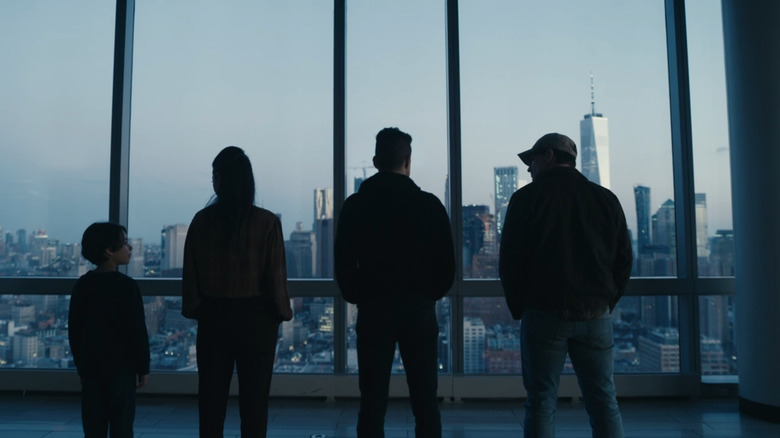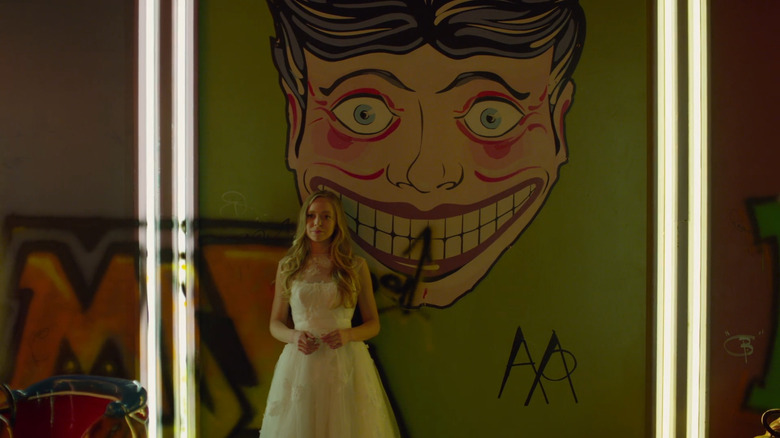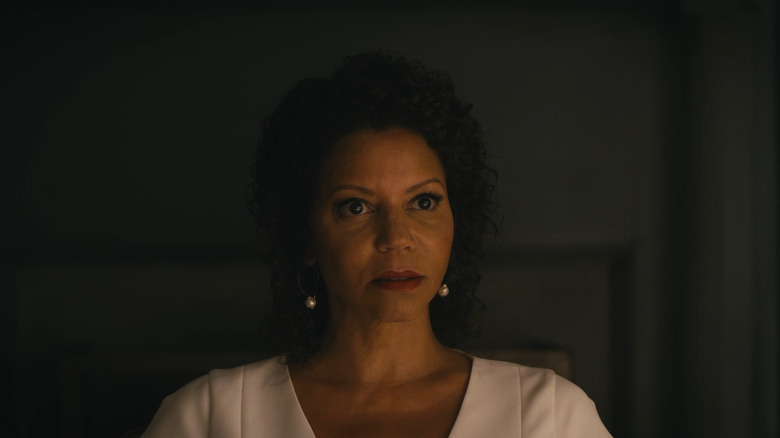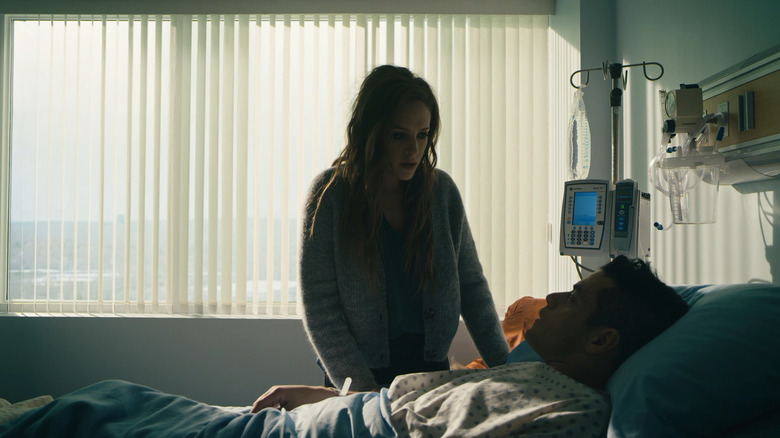Mr. Robot Ending Explained: Elliot Finally Learns To Let Go
It's been over two years since "Mr. Robot" ended and left behind a complicated yet ultimately positive legacy. Although ratings declined in season 2, which was heavily criticized for being overly-convoluted and slow, the show's fast-paced, climactic third season not only won back the acclaim of critics and fans, but retroactively improved everything that came before. All that set-up and character work in season 2 was worth it after all; we just needed to be patient.
Season 4 followed through with season 3's momentum, opening up with the sudden, shocking death of Angela Moss (Portia Doubleday). The show continued with one major, game-changing development after another, until the two-part finale where we're hit with the revelation that the master plan Whiterose (BD Wong) was working towards has worked: the world has been rebooted into a perfect utopia where everyone's loved ones are still alive. Elliot (Rami Malek) wakes up in an alternate universe where his parents were never abusive, where he isn't plagued by social anxiety and paranoia, and he's getting ready to marry Angela.
The only problem is that there's no Darlene (Carly Chaikin) in this universe, and there's two Elliots.
Learning to accept the past
One of the defining themes of the show is the characters' inability to let things go. It's Elliot and Darlene's loss of their father that sets them on a self-destructive journey to crash the world economy, and it's Angela's inability to move on from her mother's death that allows Whiterose to take advantage of her. For Angela, this arc culminates in the beginning of the season 4 premiere, where she's given the option to move on with her life. Instead, she makes it clear she plans to get revenge on Whiterose for taking advantage of her, and that's what gets her killed minutes later.
One of the most unique things "Mr. Robot" did throughout its run was to evoke a similar unwillingness to move on from loss within its own audience, and it did that through the intentionally anti-climactic, unsatisfying way it handled its major death scenes. Joanna Wellick (Stephanie Corneliussen) died before any of her schemes could fully come into fruition. Tyrell Wellick (Martin Wallström) dies alone in the woods, having failed to achieve any of his aspirations.
It's the anti-climax of Angela's death that hurts the most. She ends season 3 with what seems like the end of a painful, guilt-ridden downward spiral. Having confronted the fact that she's been the unwitting tool of a mass murderer, everything about the way her scenes in the season 3 finale play out make it seem like the show's planning a redemption arc for her. Maybe finally we'd get to see her and Elliot team up to take down Whiterose, which the show's format (her and Elliot almost always off on separate but paralleled storylines) seemed to promise us.
Instead she gets killed off not just five minutes into the season 4 premiere, but just a couple minutes (in real time) after her final scene in season 3. Not only did she not make it to the second episode of the season; she didn't even make it out of Price's backyard.
Following her death, fan theories for how Angela might actually be alive (or brought back to life) were common, and the show itself leaned into this. After all, it's rare for a show to kill off such a major character (essentially, the show's secondary protagonist) five minutes into the new season. Without much concrete evidence of any drama behind the scenes motivating the decision, fans figured: surely the show had something more planned with this character, right?
As the season went on, Whiterose repeatedly used the possibly of bringing Angela back to life as a manipulation tactic on Elliot, and most of the finale centered around the fantasy of Elliot and Angela's wedding day, which would've given fans some emotional catharsis to the potential romance teased between these two characters, one that was never followed through on while Angela was still alive. The show used our desire for closure with Angela against us, constantly tempting us to believe in the same delusion Angela herself fell for: that the past could ever actually be changed.
'You're not Elliot. You're the Mastermind'
With about 25 minutes left in the finale, Elliot's forced to confront that none of what he's seen in this new reality has been real. Whiterose's plan didn't work; Elliot's simply trapped inside a comfortable fantasy he's created for himself, one where everything is exactly the way he wants it. So much of the finale centers around Elliot having to handle the fact that in the real world, most of his friends and family are dead, and there's nothing he can do to change that. As much as we and Elliot might've wanted characters like Angela, Tyrell, Mobley, and Trenton to have better, happier endings, we're both forced to make peace with the endings they got.
And then we're hit with a bigger twist, one that redefines everything we've seen in the show so far: the main character we've been following this whole time isn't Elliot. Instead, he's been just another personality like Mr. Robot (Christian Slater). The real Elliot Alderson has been asleep this entire time, trapped inside a recurring fantasy to keep himself occupied. It's a bold twist, but it's one the show clearly had in mind from the very beginning. It explains how he forgot Darlene in season 1, how he forgot about his father's abuse; it even explains why his hair was always exactly the same in every episode.
That's right: one minor critique fans always had was the fact that as months went by throughout the show, Elliot always had a fresh-looking haircut. It seems like a nitpick, but considering how anti-social and messy Elliot was, it seemed hard to believe he was keeping regular appointments with a barber the whole time. But even this turned out to be an intentional aspect of the show: just as the Mr. Robot personality kept the same constant appearance, so did the Mastermind.
In addition to moving past the death of his friends and family, Elliot (at least, our version of Elliot) needs to move on from himself, and let the real Elliot return to his life. His goals for reshaping the world have been accomplished to the best of his abilities, after all, so there's no need for him to stick around any longer.
Darlene knew the whole time
In the final moments of the episode, when the Elliot we've been following wakes up in the hospital, he confesses to Darlene that he's not the real Elliot. In one of the most emotional moments of the show, Darlene explains that she's known this since her first appearance in season 1. "I've known since we started Fsociety. You don't act like him. At first, I thought ... maybe it was you, but different. But then you forgot who I was again, it wasn't hard to figure it out from there." When asked why she didn't say anything, she explains tearfully, "I don't know. We were hanging out, we were spending time together, it felt like we were finally getting close."
It's her telling him how much she misses the real Elliot that allows our Elliot to do the inevitable: let the original personality take back control. The finale ends with Darlene saying hello to her real brother for the first time in years.
The reason the finale was received so well, despite how complicated and confusing it may have been at times, is that it took us back to the core of what this show has always been about: two siblings reconnecting after a traumatic childhood made them grow apart. Although so much of the real Elliot's life has been destroyed since the Mastermind took over, he now at least has his sister back. As much as the hacking and the multiple personality storyline may have been major draws for the show, the finale understands that Darlene and Elliot's relationship was the real heart of "Mr. Robot."



